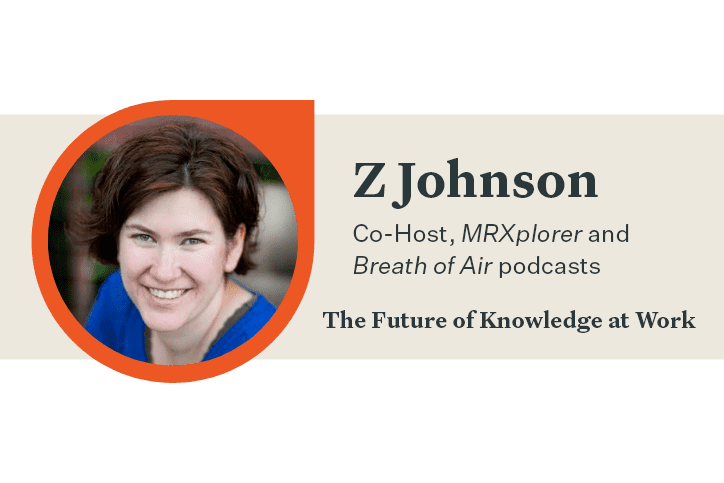Bloomfire Q&A: Z Johnson on Cross-Functional Insights Sharing, Self-Service Research, and More

One of the biggest insights industry trends that has been on our minds at Bloomfire is how research professionals can empower their stakeholders to self-serve insights—and successfully apply those insights to their decision-making. In our latest Future of Knowledge at Work interview, we were fortunate to be able to talk to MRXplorer podcast co-host Zontziry ‘Z’ Johnson about empowering stakeholders and a wide range of other topics, from the importance of cross-functional insights sharing to balancing the human element of market research with advances in technology.
With experience as a market research client, supplier, and marketer/trainer for a survey software supplier, Z brings a unique perspective to the insights industry. She is particularly interested in exploring the evolution taking place in the market research industry with new technologies, evolving methodologies, and the growing field of DIY researchers.
You can check out our interview below.
1. Tell us a little about yourself.
I’m a second-generation Latina with an Associates degree in Piano Performance, a Bachelor’s degree in Business, and a Masters in Business Administration. I had every intention of becoming a concert solo pianist, but I later decided to change my degree for a whole host of reasons. I still remember sitting with the university catalog of majors, looking for something to move into that wouldn’t completely erase the work I’d done to get my Associates degree, and choosing Business for really no other reason than because it looked like I could finish it in two years. Three years later, I finished my Bachelor’s in Business.
Aside from that fun educational adventure, I grew up with Star Trek, Star Wars, and James Bond in addition to weekly trips to the library for stacks and stacks of books to read. My husband introduced me to European-style strategy board games, and we now own over 500 such games. And, because my child goes to sleep right when I want to play the piano, I’ve picked up a much quieter artistic hobby and love playing with watercolor.
2. What led you to start your career in market research?
My career in market research started with a need to fill a timecard with projects while part of a publishing department at a Department of Energy national laboratory. It turned out someone else in the department needed help programming surveys and pulling the auto-generated data reports for internal customers. I gained further exposure to the world of market research through my MBA marketing class, but I mostly taught myself how to write good survey questions, and how what I was doing could have a business impact.
Later in my career, I decided to try my hand at business consulting, since I enjoyed problem-solving so much. I found myself bored on the bus ride into work one day, and, to fill my time, decided to start counting the number of times I saw various rain jacket brands to figure out what seemed to be the most common brand purchased and in what color. I realized I was doing market research for fun, and decided to make my way back to the industry as a result.
3. Based on your experience in both client-side and supplier-side market research roles, what do you think are some of the biggest knowledge management challenges for market research professionals? Do you see different challenges for client-side vs. supplier-side researchers?
There are a few aspects to knowledge management that I’ve run into when it comes to market research.
- Insights professionals’ general market knowledge. It’s all too common for someone to leave a team, and, as they walk out the door, so does a lot of knowledge that person had built about the organization, the organization’s target audience, and internal resources for rounding out insights recommendations. This isn’t a market research industry-only issue; it happens across all sorts of companies. The problem with it in the insights world is that either the new person coming in has to basically rebuild knowledge, which might include running studies that had already been run in the recent past, or an organization not having the funds to hire a backfill, in which case, there is no new owner for that knowledge.
- Insights professionals’ specific knowledge. Market researchers aren’t always in the habit of sharing every version of a report they’ve created. That can mean losing out on recommendations that were tailored to various stakeholders. This is true for brand-side and supplier-side. By the same token, not all brand-side researchers ask market research suppliers for the raw data behind a study they just fielded. To me, this is an even bigger issue than not having copies of the various reports that were created to communicate the data from said study, and it exists primarily on the part of the brands.
- Cross-functional knowledge. It’s so easy, whether brand-side or supplier-side, to focus only on the studies over which you are responsible, ignoring any other studies that might have a question or two that are relevant to you. As a client, I sometimes wondered why suppliers who were managing multiple studies for the team I was on didn’t create a report that pulled all of those studies together to create a cohesive view of the audience that was being researched from different angles. As a supplier, I didn’t have the time to coordinate insights across multiple studies that my colleagues were managing.
4. Thoughts on how new technologies are changing the ways research professionals share knowledge and insights with their stakeholders?
First, I’d say research professionals have many more options for teaching their stakeholders how to be self-serve for the basic questions. For example, a dashboard with the right filters on it can allow a stakeholder to answer questions like, “What’s the purchase intent amongst women ages 18-34?”
That kind of access can make it easier to have fluid conversations with stakeholders instead of the more traditional data read-outs. In turn, that can mean the meatier questions are the ones that take up the analytic time, rather than the simpler data cuts.
I also think that research professionals are finding themselves needing to become more comfortable with releasing control of the data they collect for their stakeholders. Stakeholders are increasingly unwilling to wait for the research professionals to provide the data cuts requested.
5. How do you balance technology and improving automation with the human element of market research?
There’s been much said about “market research becoming obsolete.” I think that’s far from the case. I think, instead, market research is evolving into humans needing to interpret the data that is being collected by technology and via automation. Just as a doctor PLUS the Artificial Intelligence algorithms are more accurate together than either one on their own, insights professionals have the opportunity to use technology in a way that creates more accurate predictions of human purchasing behavior.
Technology can make it easier to find the answers; humans still need to know what questions to ask.
6. What best practices would you recommend for sharing insights with stakeholders and encouraging stakeholders to act on those insights?
If you were to sit in the stakeholders’ shoes, what would encourage you to act on a piece of insight delivered from someone else? In my opinion, it’s the insight that actually answers a business question, that’s relevant to my work, and that’s easy for me to share with those who aren’t in the room at the moment the insight is communicated.
To get there, though, insights professionals need to know more than just the surface layer of their stakeholders’ work. They need to ask, probe, treat a sync or a kick-off call with a stakeholder as an in-depth interview to draw out what the stakeholder is responsible for delivering, in what time frame, to what audience, and who does the stakeholder need to communicate whatever insights you deliver on to their stakeholders?
7. Can you tell us a bit about your podcast, MRXplorer? What are a few of the most surprising learnings that have come out of the interviews you and your co-host, Kristina, have conducted for the podcast?
We decided this last year to take on the topic of diversity, equity, and inclusion in the market research industry. I don’t know that this was necessarily surprising, but each interview taught us how much we didn’t know about this space. Possibly the best lesson we learned was that difficult conversations aren’t things that other people are able to have. We’re able to have them, too, but it takes a true desire to learn, to ask, and to listen.
8. What recommendations do you have for anyone just starting a career in the insights industry? What skill sets or areas of knowledge do you think are most important to focus on to grow in your career?
First, I’d say connect with your local Insights Association group or other market research meetup group that might exist where you live. This will allow you to learn about a variety of sub-topics in market research: qualitative vs quantitative; focus groups vs in-depth interviews; online communities; user experience research; customer experience research; business-to-business research; pharmaceutical research. And that’s just the tip of the iceberg!
Second, I think the insights professional of today is increasingly required to be a strong storyteller, not just a strong analyst or a strong project manager. Storytelling in market research sits at the intersection of running a study (need to know what questions to ask so that you get the best data possible) and analyzing the data (knowing what pieces of information to pull out to share with your stakeholders). Today’s insights professional is also required to be flexible—far more flexible than market researchers were even ten years ago. This flexibility also engenders a need for creativity, as budgets get smaller, timelines get shorter, and technology continues to evolve.
Thanks for sharing your expertise with us, Z!
If you enjoyed this interview, make sure to check out some of our other interviews with insights leaders:
Danielle Todd on Leveraging Curiosity, Knowing Your Audience, and More
Priscilla McKinney on Empathy, Knowledge Management, and Context in Marketing
Roben Allong on Cultural Insights, a Recalibration in Market Research, and More

How to Build an Insights Engine: The People, Technology, and Culture You Need

How to Measure the ROI of Knowledge Management

How to Navigate the Chain of Command in Business to Get Executive Buy-in

Start working smarter with Bloomfire
See how Bloomfire helps companies find information, create insights, and maximize value of their most important knowledge.

Take a self guided Tour
See Bloomfire in action across several potential configurations. Imagine the potential of your team when they stop searching and start finding critical knowledge.